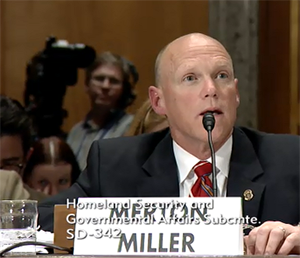Feds probe contractor that vetted Snowden
While the inquiry is unrelated to Snowden's clearance, 'background investigations have real consequences,' McCaskill says.

Edward Snowden's security clearance gave him access to information on a secret NSA surveillance program, which he disclosed. (Photo by The Guardian)
The firm that provided a background check in 2011 on Edward Snowden, the former National Security Agency contractor who disclosed details of top secret surveillance programs to the press, is under investigation by the federal government for contract fraud.
Sen. Claire McCaskill (D-Mo.) disclosed the investigation of the firm USIS in a June 20 Senate hearing that probed how the government oversees background checks for the more than 4 million contractors and government employees that require security clearances of secret or higher to perform their duties. The investigation was confirmed by Michelle B. Schmitz, the assistant inspector general for investigations at the Office of Personnel Management, who testified at the hearing.
The USIS investigation is unconnected to Snowden's clearance, and was launched after USIS supplied a reinvestigation into Snowden's background. Schmitz did not know whether USIS conducted the initial investigation that cleared Snowden to work on classified material, and a USIS spokesman declined to clarify.
"USIS conducts thousands of background investigations annually for OPM and other government agencies," Corporate Communications Director Ray Howell said when contacted for comment. "These investigations are confidential and USIS does not comment on them."
McCaskill, however, stressed at the hearing that Snowden's clearance showed the system has problems. "It's a reminder that background investigations have real consequences for our national security," she said.
The background check procedure itself came under fire on number of fronts at the hearing. OPM maintains a $1 billion revolving fund to finance background investigations, with funds being reimbursed by the agencies that request clearances. OPM Inspector General Patrick McFarland complained that his office was not permitted access to the revolving fund for audit purposes, and lacks the resources to monitor spending. "We try to stay tuned into what is going on," said McFarland, adding that it was a "sad state of affairs" for an inspector general not to be able to probe more deeply into a fund that size. McCaskill said it was "outrageous" that the fund had never been audited.
OPM contracts out 75 percent of its investigations to contractors, with USIS getting the bulk of the assignments. The Defense Department is OPM's biggest customer. While OMB oversees the investigations, the requesting agency is responsible for evaluating the findings, and deciding on whether to grant security clearances. In fiscal year 2012, DOD paid OPM $735 million for clearance investigations, with $471 million going to investigations of military personnel, $252 million for private contractors, and $30 million for civilian employees.
The Defense Department's personnel security clearance program was removed from the High Risk List of the Government Accountability Office in 2011, not long after OMB took over the function. Yet problems remain with the overall clearance process, according to Brenda Farrell, director of Defense Capabilities and Management at GAO, including a lack of government-wide standards to determine which civilian jobs require security clearances.
"While the executive branch has made strides in improving the timeliness of the personnel security clearance process," she said, "now is the time to focus on making the improvements GAO has recommended."

OPM's Merton Miller: 'Quality is in the eye of the beholder.'
Merton Miller, associate director of investigations at OPM's Federal Investigative Services unit, said that his agency had implemented a number of GAO recommendations in the last fiscal year regarding financial transparency and resources. He also spoke to the need for more clarity in terms of conducting background checks. "Today, quality is in the eye of the beholder. Give us defined roles. Give us quality standards we understand that are clear," he said.
Sen. Jon Tester (D-Mont.), who chaired the hearing, said, "In terms of securing classified information, we don't just have an external problem, we have an internal problem."
Note: This story was updated to include comments from USIS that were obtained after initial publication.






